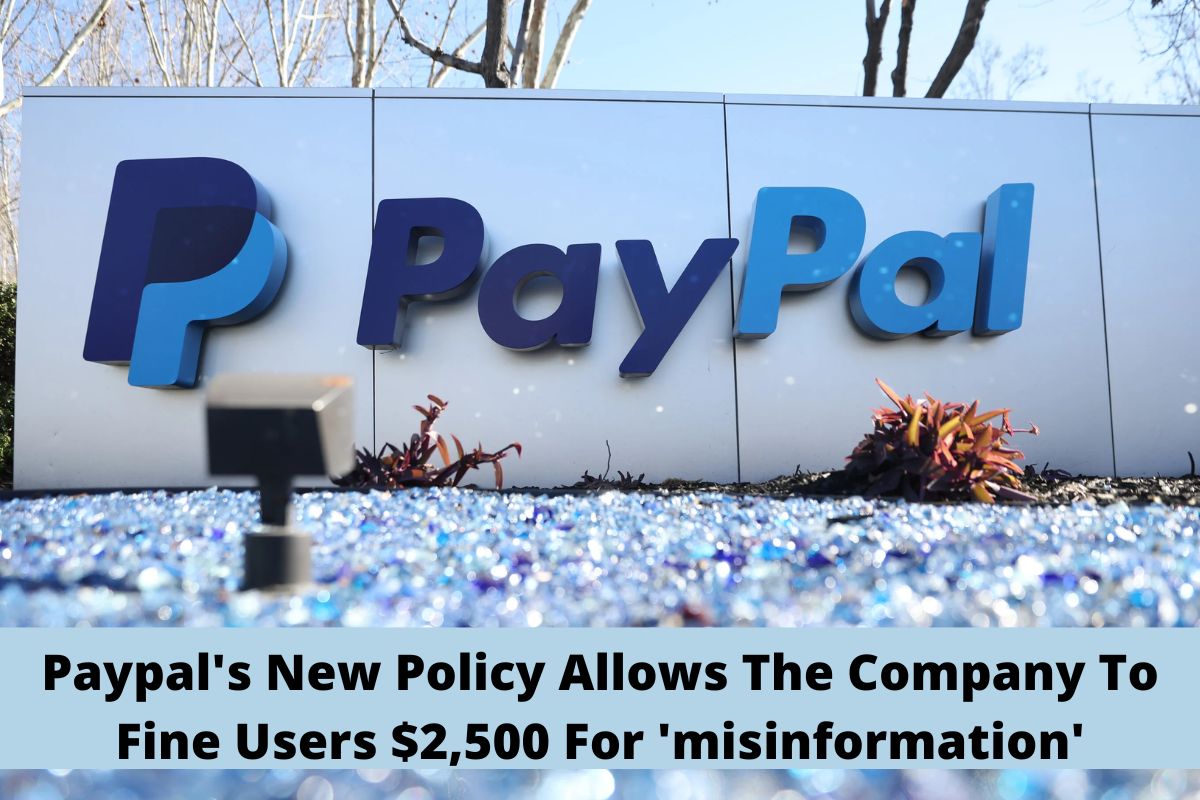Note: Latest Update [Date – 10 Oct 2022] : PayPal says $2,500 fine for ‘misinformation’ was posted to policy in error
PayPal has reversed a previously published policy that would have punished users $2,500 for disseminating “misinformation,” stating that the amendment was distributed “in error.”
“An AUP notice was recently distributed in error that contained inaccurate information.” PayPal does not fine anyone for providing incorrect information, and this statement was never meant to be included in our policy. Our teams are working hard to update our policy pages. “We apologize for any confusion this has caused,” a spokeswoman said in a written response to National Review.
The course correction comes after the policy modifications drew media scrutiny as well as criticism on Twitter. Former PayPal CEO David Marcus even chastised the firm for implying that it could confiscate consumers’ funds if it found their opinions disagreeable.
“It’s difficult for me to openly criticize a corporation that I used to adore and to which I gave so much.” “However, @PayPal’s new AUP contradicts everything I believe in,” the cryptocurrency entrepreneur stated on Saturday. “A private corporation can now choose whether or not to take your money if you say something they disagree with.” Insanity.”
In a comment that received hundreds of likes, tech mogul Elon Musk answered, “Agreed.”
The policy change appears to empower the business to withdraw large sums of money from the accounts of users who disseminate “misinformation,” among other newly specified infractions.
If you think that #PayPal is bad because of the new and anyway withdrawn policy which would have allegedly fined up to 2500 USD those who spread "misinfomation" according to PayPal's idea of "misinformation", wait until you see what central banks will be able to do with #CBDC s. pic.twitter.com/Y7QUW4LUxh
— Air VPN (@airvpn) October 9, 2022
The new terms were set to be introduced to the PayPal User Agreement’s restricted activity section on November 3, according to the Daily Wire. Prohibitions on “the transmission, uploading, or publication of any communications, content, or materials that propagate misinformation” were among the changes. While the previous policy already prohibited “hate,” “intolerance,” and discrimination, the new policy would have applied specifically to “protected groups” and “individuals or groups based on protected characteristics.” These identities included a race, religion, gender or gender identity, and sexual orientation.
These terms are not included in the firm’s current rules. It’s unclear whether PayPal will remove these particular limitations on “discriminatory” language as well, or if it would merely remove the “misinformation” phrase.
Breaking the rule against misinformation and hate speech “may subject you to damages, including liquidated damages of $2,500.00 USD per violation, which may be deducted immediately from your PayPal account,” the business had previously warned. Account holders accept and attest in a user agreement that the penalty is “currently a reasonable minimum estimate of PayPal’s actual damages” due to the expense incurred by accounting for the infractions as well as damage to the firm’s reputation.
Peter Thiel, the founder of PayPal, has invested in a number of GOP rising stars and “conservative” business initiatives. eBay bought the company in 2002 and has run it ever since. PayPal has been known in recent years to ban or deplatform organizations or people for specific political criticism, notably right-wing commentary.
Note: Latest Update [Date – 10 Oct 2022] : PayPal says $2,500 fine for ‘misinformation’ was posted to policy in error
Read More:
- Indonesia Has Shut Down Steam, Paypal, And Other Services Due To A Failed Regulatory Deadline
- PayPal and Venmo’s new IRS 1099 rule is aimed at very small businesses, and it is likely to lead to inaccurate reporting and other mistakes.
- Apple pays a record $100,500 to the student who detected a Mac webcam hack
It recently outlawed Gays Against Groomers, a group of LGBT-identifying persons who claim to be raising awareness about the sexualization and medicalization of children through gender ideology and the transgender movement. The organization was apparently denied access to PayPal’s affiliate Venmo minutes afterward. Colin Wright, an evolutionary biologist, and writer Ian Miles Cheong, who consistently highlights the perils of transgenderism for youngsters, have also been deleted.
FAQs
What is the new PayPal policy?
Policy revisions take effect on September 19, 2022: Beginning October 31, 2022, US business accounts will be unable to receive personal transactions from PayPal accounts outside the US. Beginning October 31, 2022, PayPal accounts in the United States will be unable to transmit personal transactions to business accounts outside the United States.
Who controls PayPal?
eBay
After seeing PayPal become the preferred method of payment for Internet auction buyers, online marketplace giant eBay purchased PayPal for $1.5 billion in October 2002.
What are the PayPal fees in 2022?
PayPal rate increases and updates will take effect on June 17, 2022.
PayPal Consumer Account quick transfers are going to 1.75% with a $0.25 minimum and a $25 maximum (up from 1.5% with a $0.25 minimum and a $15 maximum).
Why did eBay discontinue its use of PayPal?
eBay claims it is switching from PayPal to Adyen to “enhance its customer experience” by facilitating payments on its marketplace. “By doing so, eBay will control the payments flow, streamlining the end-to-end customer and seller experience,” the business stated in a statement.
How can I prevent PayPal from storing my money?
The good news is that you can generally get out of this position by establishing your identity and developing a track record of successful sales. You haven’t sold in a long time. It will take time to rebuild a history of positive buyer-seller transactions if your selling activity has been dormant for a long period.
Note: Latest Update [Date – 10 Oct 2022] : PayPal says $2,500 fine for ‘misinformation’ was posted to policy in error
